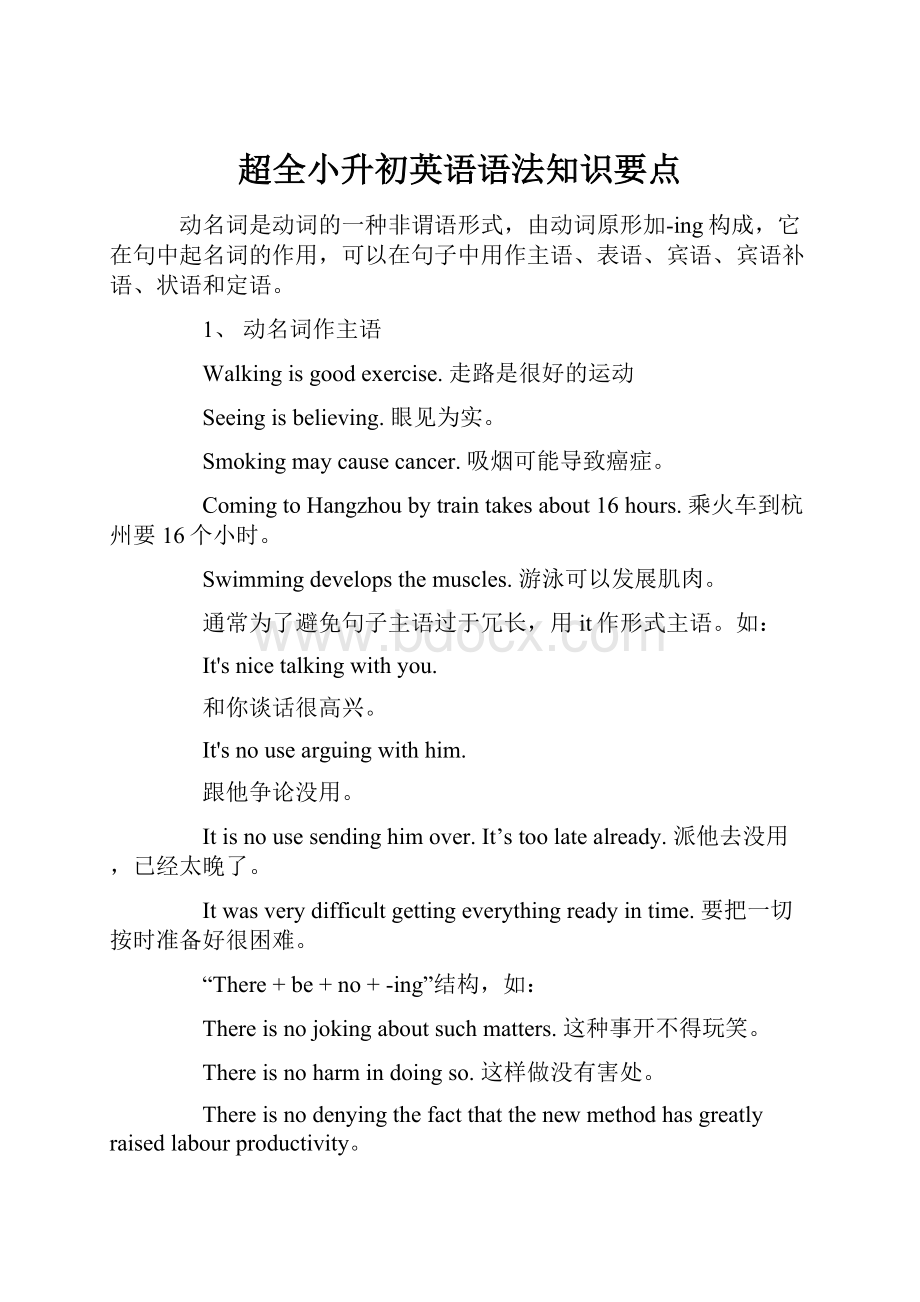超全小升初英语语法知识要点.docx
《超全小升初英语语法知识要点.docx》由会员分享,可在线阅读,更多相关《超全小升初英语语法知识要点.docx(27页珍藏版)》请在冰豆网上搜索。

超全小升初英语语法知识要点
动名词是动词的一种非谓语形式,由动词原形加-ing构成,它在句中起名词的作用,可以在句子中用作主语、表语、宾语、宾语补语、状语和定语。
1、动名词作主语
Walkingisgoodexercise.走路是很好的运动
Seeingisbelieving.眼见为实。
Smokingmaycausecancer.吸烟可能导致癌症。
ComingtoHangzhoubytraintakesabout16hours.乘火车到杭州要16个小时。
Swimmingdevelopsthemuscles.游泳可以发展肌肉。
通常为了避免句子主语过于冗长,用it作形式主语。
如:
It'snicetalkingwithyou.
和你谈话很高兴。
It'snousearguingwithhim.
跟他争论没用。
Itisnousesendinghimover.It’stoolatealready.派他去没用,已经太晚了。
Itwasverydifficultgettingeverythingreadyintime.要把一切按时准备好很困难。
“There+be+no+-ing”结构,如:
Thereisnojokingaboutsuchmatters.这种事开不得玩笑。
Thereisnoharmindoingso.这样做没有害处。
Thereisnodenyingthefactthatthenewmethodhasgreatlyraisedlabourproductivity。
不容否认新方法大大提高了劳动生产率。
2、动名词作表语
Herjobisraisingpigs.她的工作是养猪。
Thisfoodsmellsinviting.这种食物香味怡人。
Theonlythingthatinterestsherisdancing.她唯一感兴趣的事就是跳舞。
Myfavoritesportisswimming.我最喜欢的运动是游泳。
Tokeepmoneyyouhavefoundisstealing.捡到钱不交等于偷窃。
3、动名词作宾语
Yourshoesneedpolishing.你的皮鞋该擦了。
Jimdislikeseatingchocolate.吉姆不喜欢吃巧克力。
Shecan’thelpcryingatasadmovie.她看了忧伤的电影禁不住要哭。
Thedoctoradvisedtakingexercise.医生让多运动。
Wouldyoumindfillingoutthisform?
请填一下这张表好吗?
Thethiefadmittedenteringthehouse.小偷承认进了屋。
Haveyoufinishedcorrectingthestudents’papers?
学生们的卷子改完没有?
有些动词和动词短语后只能接动名词作宾语。
这些动词及短语有:
admit,acknowledge,advise,appreciate,avoid,delay,deny,dislike,enjoy,excuse,escape,fancy,finish,forgive,face,endure,involve,giveup,imagine,mention,mind,miss,pardon,practise,require,resent,resist,suggest,recall,resist,understand,thinkof,giveup,aimat,putoff,insiston,persistin,begoodat,dowellin,can'thelp,keepon,leaveoff,feellike,betired(afraid,capable,fond)of,setabout,beusedto,objectto,devoteoneselfto,stickto,respondto,lookforwardto,seeto,submitto,adaptto,applyto,accedeto,getto,preferto,adjustto,oweto,reactto等。
4、动名词作宾语补语
Ifoundtheparadequiteinterestingtowatch。
这种用法通常用在下列几类动词中,后接宾语然后加上-ing分词,构成复合宾语结构,动名词充当宾补成分。
表示感觉和心理状态的动词,如:
see,hear,feel,find,smell,watch,find,listento,lookat,notice,observe等。
如:
TherewefoundhimwatchingTV。
我们发现他在那儿看电视。
Iheardsomeoneknockingatthedoor。
我听见有人在敲门。
在有些动词(如:
regard,describe,accept,thinkof,quote等)之后,可由as引出-ing分词词组作宾补。
如:
Theyregardedthecontractasbeinginvalid。
他们认为合同无效。
Theydescribedthechildasbeingveryclever。
他们描述这孩子非常聪明。
使役动词,如:
set,keep,have,get,leave,catch等。
如:
Canyougetmywatchgoingagain?
你能使我的表再走起来吗?
Thissetsmethinking。
这使我思考。
5、动名词作状语
动名词作状语表示在进行一动作的同时所进行的另一动作,它对谓语动词起修饰和陪衬的作用。
动名词作状语可以表示时间、原因、条件、让步、结果、方式或伴随情况。
Havingcleanedtheroomswebegantoweedthegarden.(时间)
打扫完房间,我们开始在花园里除草。
Comingintotheroom,shesaweverybodyalreadyattheirwork.(时间)
进屋以后,她看到人人都在工作。
Beingill,hecouldn'tgotoschool.(原因)
因为生病,他不能去上学。
Havingnointerestinthetopic,hedidn'tgotothelecture.(原因)
由于对这个话题没有兴趣,他没去参加讲座。
Workingdiligently,youwillcertainlysucceed.(条件)
只要刻苦学习,你会成功的。
Usingatomicenergy,wecanbuildspaceships.(条件)
利用原子能,我们能够建造太空船。
Grantingtheachievementstobegreat,thereisstillsomethingtobedesired.(让步)
(尽管)成绩是巨大的,(但)仍有一些要求改进的东西。
Mycarwascaughtinatrafficjam,thuscausingthedelay.(结果)
我的车被交通拥挤堵住,所以延误了。
Travelingbytrain,wevisitedanumberofcities.(方式)
我们坐火车访问了好多城市。
Marysatbythewindowoftheclassroom,readingabook.(伴随)
玛丽坐在教室的窗户旁,正在读一本书。
6、动名词作定语
动名词作定语时和形容词的功能是相似的。
动名词可以单独作定语,如:
asmilingface笑脸
aleadingfigure领导人物
动名词还能构成合成词作定语,如:
easy-goingman好说话的人
swimmingpool游泳池
sleeping-pill安眠药片
dining-car餐车
当分词短语做后置定语时,可以转换成定语从句。
ShewentonboardthetrainleavingforShanghai。
=Shewentonboardthetrain,whichwasleavingforShanghai。
她乘坐了去上海的火车。
Therearetworoadsbeforeus,oneleadingtothebeach,theothertothepark。
=Therearetworoadsbeforeus,onewhichleadstothebeach,theothertothepark。
在我们面前有两条路,一条通向沙滩,另一条通向公园。
现在来总结一些动词不定式的特殊句型!
不定式的特殊句型too…to…
1)too…to 太…以至于…
Heistooexcitedtospeak.他太激动了,说不出话来。
----CanIhelpyou?
需要我帮忙吗?
----Well,I'mafraidtheboxistooheavyforyoutocarryit,butthankyouallthesame. 不用了。
这箱子太重,恐怕你搬不动。
谢谢您。
2)如在too前有否定词,则整个句子用否定词表达肯定,too后那个词表达一种委婉含义,意为"不太"。
It'snevertoolatetomend. (谚语)改过不嫌晚。
3)当too前面有only,all,but时,意思是:
非常…等于very。
I'monlytoopleasedtobeabletohelpyou.我非常高兴能帮助你。
Hewasbuttooeagertogethome.他非常想回家。
不定式的特殊句型soasto
1)表示目的;它的否定式是soasnottodo。
Tomkeptquietabouttheaccidentsoasnottolosehisjob. 汤姆对事故保持沉默是为了不丢掉他的工作。
Goinquietlysoasnottowakethebaby.轻点进去,别惊醒了婴儿。
2)sokindasto---劳驾
Wouldyoubesokindastotellmethetime?
劳驾,现在几点了。
不定式的特殊句型Whynot
"Whynot+动词原形"表达向某人提出建议,翻译为:
"为什么不……?
""干吗不……?
"
例如:
Whynottakeaholiday?
干吗不去度假?
不定式的时态和语态
时态语态
主动
被动
一般式
todo
tobedone
进行式
tobedoing
完成式
tohavedone
tohavebeendone
完成进行式
tohavebeendoing
1)现在时:
一般现在时表示的动词,有时与谓语动词表示的动作同时发生,有时发生在谓语动词的动作之后。
Heseemstoknowthis。
Ihopetoseeyouagain.=IhopethatI'llseeyouagain. 我希望再见到你。
2)完成时:
表示的动作发生在谓语动词表示的动作之前。
I'msorrytohavegivenyousomuchtrouble。
Heseemstohavecaughtacold。
3)进行时:
表示动作正在进行,与谓语动词表示的动作同时发生。
Heseemstobeeatingsomething。
4)完成进行时:
Sheisknowntohavebeenwreakingontheproblemformanyyears。
动名词与不定式
1)动名词与不定式的区别:
动名词表达的是:
状态,性质,心境,抽象,经常性,已发生的
不定式表达的是:
目的,结果,原因,具体,一次性,将发生的
2)接不定式或动名词,意义相同。
3)动名词与不定式语义不同的有11组:
stoptodostopdoing
forgettodoforgetdoing
remembertodorememberdoing
ceasetodoceasedoing
trytodotrydoing
goontodogoondoing
afraidtodoafraiddoing
interestedtodointeresteddoing
meantodomeandoing
regrettodoregretdoing
begin/starttodobegin/startdoing
特殊词精讲
stopdoing/todo
stoptodo 停止,中断做某事后去做另一件事。
stopdoing 停止做某事。
Theystoptosmokeacigarette. 他们停下来,抽了根烟。
Imuststopsmoking.我必须戒烟了。
典型例题
Shereachedthetopofthehillandstopped___ onabigrockbythesideofthepath.
A.tohaverested B.resting C.torest D.rest
答案:
C。
由题意可知,她到了山顶,停下来在一个路边的大石头上休息。
因此,应选择"stoptodosth.停下来去做另一件事"。
而不仅仅是爬山动作的终止,所以stopdoingsth。
不正确。
stopdoing/todo
forgetdoing/todo
forgettodo 忘记要去做某事。
(未做)
forgetdoing 忘记做过某事。
(已做)
Thelightintheofficeisstilon.Heforgottoturnitoff.办公室的灯还在亮着,它忘记关了。
(没有做关灯的动作)
Heforgotturningthelightoff.他忘记他已经关了灯了。
(已做过关灯的动作)
Don'tforgettocometomorrow.别忘了明天来。
(tocome动作未做)
典型例题
----Thelightintheofficeisstillon。
----Oh,Iforgot___.
A.turningitoff B.turnitoff C.toturnitoff D.havingturneditoff
答案:
C。
由thelightisstillon可知灯亮着,即关灯的动作没有发生,因此用forgettodosth。
而forgetdoingsth表示灯已经关上了,而自己忘记了这一事实。
此处不符合题意。
trydoing/todo
trytodo 努力,企图做某事。
trydoing 试验,试着做某事。
Youmusttrytobemorecareful. 你可要多加小心。
Itriedgardeningbutdidn'tsucceed.我试着种果木花卉,但未成功。
goondoing/todo
goontodo 做了一件事后,接着做另一件事。
goondoing 继续做原来做的事。
Afterhehadfinishedhismaths,hewentontodohisphysics.做完数学后,他接着去做物理。
Goondoingtheotherexerciseafteryouhavefinishedthisone.作完这个练习后,接着做其他的练习
beafraiddoing/todo
beafraidtodo 不敢,胆怯去做某事,是主观上的原因不去做,意为"怕";
beafraidofdoing 担心出现doing的状况、结果。
doing是客观上造成的,意为"生怕,恐怕"。
Shewasafraidtostepfurtheringrassbecauseshewasafraidofbeingbittenbyasnake.她生怕被蛇咬着,而不敢在草丛中再走一步。
Shewasafraidtowakeherhusband.她不敢去叫醒她丈夫。
Shewasafraidofwakingherhusband.她生怕吵醒她丈夫。
beinteresteddoing/todo
interestedtodo 对做某事感兴趣,想了解某事。
interestedindoing 对某种想法感兴趣,doing通常为想法。
Ishallbeinterestedtoknowwhathappens.我很想知道发生了什么事。
(想了解)
I'minterestedinworkinginSwitzerland.Doyouhaveanyideaaboutthat?
我对在瑞士工作感兴趣。
你想过这事吗?
(一种想法)
meantodoing/todo
meantodo 打算、想
meandoing 意味着
Imeantogo,butmyfatherwouldnotallowmeto.我想去,但是我父亲不肯让我去。
Toraisewagemeansincreasingpurchasingpower.赠加工资意味着增加购买力。
begin(start)doing/todo
begin/starttodosth
begin/startdoingsth。
1)谈及一项长期活动或开始一种习惯时,使用doing。
Howoldwereyouwhenyoufirststartedplayingthepiano?
你几岁时开始弹钢琴?
2)begin,start用进行时时,后面动词用不定式todo
Iwasbeginningtogetangry. 我开始生起气来。
3)在attempt,intend,begin,start后接know,understand,realize这类动词时,常用不定式todo。
Ibegintounderstandthetruth. 我开始明白真相。
4)物作主语时
Itbegantomelt。
感官动词+doing/todo
感官动词see,watch,observe,notice,lookat,hear,listento,smell,taste,feel+do 表示动作的完整性,真实性;+doing表示动作的连续性,进行性
Isawhimworkinthegardenyesterday. 昨天我看见他在花园里干活了。
(强调"我看见了"这个事实)
Isawhimworkinginthegardenyesterday.(强调"我见他正干活"这个动作)昨天我见他正在花园里干活。
典型例题
1)Theyknewherverywell.Theyhadseenher___upfromchildhood.
A.grow B.grew C.wasgrowing D.togrow
答案:
A.因题意为,他们看着她长大,因此强调的是成长的过程,而非正在长的动作,因此用seesbdosth。
的句型。
2)Themissingboywaslastseen___neartheriver.
A.playing B.tobeplaying C.play D.toplay
答案:
A.本题强调其动作,正在河边玩,应此用seesb.doingsth句型。
1、动词+不定式
afford,aim,appear,agree,arrange,ask,be,decide,bother,care,choose,come,dare,demand,desire,determine,expect,elect,endeavor,hope,fail,happen,help,hesitate,learn,long,mean,manage,offer,ought,plan,prepare,pretend,promise,refuse,seem,tend,wait,wish,undertake
Thedriverfailedtoseetheothercarintime. 司机没能及时看见另一辆车。
Ihappentoknowtheanswertoyourquestion. 我碰巧知道你那道问题的答案。
2)动词+不定式;动词+宾语+不定式
ask,beg,choose,expect,hate,helpintendlike,love